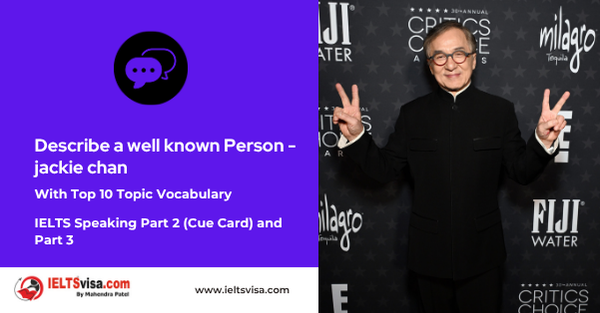Describe a well-known person – Jackie Chan
IELTS Speaking Part 2 (Cue Card) Part 3: Follow-Up Questions
Describe a well-known person – Jackie Chan
IELTS Speaking Part 2 (Cue Card) Part 3: Follow-Up Questions
Describe a well-known person – Jackie Chan
🗂️ Part 2 – Cue Card
Describe a well-known person.
You should say:
• Who he/she is
• What makes him/her famous
• Why you admire him/her
And explain why you like it
🗣️ Sample Answer
Examiner: You have one to two minutes. Please begin speaking now.
Candidate (Miss Wang):
One well-known person I truly admire is Jackie Chan, the internationally famous actor, stuntman, and filmmaker. He’s originally from Hong Kong and has been active in the film industry for decades, gaining fans from all around the world.
Jackie Chan is most famous for performing his own stunts, his unique blend of martial arts and comedy, and for bringing Chinese action cinema to global audiences. Some of his most popular movies include Drunken Master, Rush Hour, and Police Story. His creative fight choreography and fearless acrobatic style set him apart from other actors.
I admire him not only for his talent and dedication but also for his humility and humanitarian efforts. Despite being incredibly successful, he remains grounded and uses his fame to support charities and promote causes like education and disaster relief. His life story, perseverance, and work ethic inspire me to keep working hard and never give up.
🔁 Part 3: Follow-Up Questions
1. Do you want to become famous?
I don’t have a strong desire to become famous. While fame brings recognition and new opportunities, it also entails stress, public scrutiny, and a loss of privacy. I prefer to focus on making a difference in people’s lives rather than being widely known.
2. How can someone become a well-known person in your country?
In countries like China, achieving fame typically involves excelling in fields such as entertainment, sports, or public service. Using platforms like social media, appearing in the news, or doing something extraordinary can also boost fame. But long-term recognition usually comes from consistent talent and contribution.
3. What kind of people usually become famous in China?
Film stars, athletes, singers, and entrepreneurs often become famous in China. Recently, influencers and livestreamers have also gained popularity through digital platforms. Individuals involved in major events or social causes can also gain significant recognition very quickly.
4. What are the advantages and disadvantages of being famous?
The advantages include greater career opportunities, public influence, and sometimes financial wealth. However, being famous also brings intense pressure, loss of privacy, and constant judgment from the public and media. It can be emotionally exhausting if not handled carefully.
5. What are your thoughts on the privacy of celebrities?
I believe everyone, including celebrities, deserves privacy. Just because someone is in the public eye doesn’t mean their personal life should be public property. Media and fans should respect their boundaries and avoid unnecessary intrusion.
6. How do celebrities and advertising relate to each other?
Celebrities often endorse products because their popularity can influence consumer choices. A well-known person can significantly boost a brand’s image and sales. However, it’s essential that their endorsements are genuine and align with their values; otherwise, it can appear fake or misleading.
7. Do you personally get influenced by celebrity endorsements?
Sometimes I do take notice of products promoted by celebrities, especially if I admire the person. But before purchasing, I still research the product’s quality and reviews. While it may spark interest, it doesn’t fully influence my buying behaviour.
8. Do you talk about famous singers or entertainers with your friends?
Yes, often. We discuss their new music, public appearances, and social media updates. It’s fun to share opinions and recommendations, and sometimes we even attend concerts or follow live events together.
9. Are there differences between how older and younger people view celebrities?
Yes, definitely. Older generations often admire public figures for their achievements or traditional values. Younger people, on the other hand, tend to follow celebrities for their style, personality, and online presence, especially on platforms like Instagram or TikTok.
10. Should famous people use their influence for social good?
Absolutely. Since they have a large audience, they can raise awareness about important issues and inspire positive change. Many celebrities already support charities or speak up about social topics, and I think that’s a very responsible use of their fame.
Top 10 Topic Vocabulary – Describe a well-known person – Jackie Chan
|
Vocabulary |
Type |
Meaning |
Synonyms |
Antonyms |
Word Family |
Example Sentence |
|
Renowned |
Adjective |
Known and admired by many people |
Famous, Celebrated |
Unknown, Obscure |
Renown (Noun) |
Jackie Chan is a renowned actor and martial artist. |
|
Acrobatic |
Adjective |
Involving physical skill and agility |
Agile, Gymnastic |
Clumsy, Awkward |
Acrobat (Noun) |
His acrobatic fight scenes are thrilling to watch. |
|
Choreography |
Noun |
Planned movements in dance or action scenes |
Routine, Movement design |
— |
Choreograph (Verb) |
The choreography in his action films is complex and original. |
|
Prowess |
Noun |
Skill or expertise in a specific area |
Mastery, Talent |
Incompetence, Ineptitude |
Proficient (Adjective) |
His martial arts prowess is admired around the world. |
|
Humanitarian |
Adjective |
Concerned with human welfare and helping others |
Charitable, Altruistic |
Selfish, Uncaring |
Humanity (Noun) |
He is also known for his humanitarian work in Asia. |
|
Philanthropy |
Noun |
Giving money or support to good causes |
Charity, Generosity |
Greed, Self-interest |
Philanthropic (Adjective) |
Jackie Chan has contributed to many causes through his philanthropy. |
|
Perseverance |
Noun |
Continuing to do something despite difficulties |
Determination, Endurance |
Laziness, Surrender |
Persevere (Verb) |
His perseverance in training and career is truly inspiring. |
|
Boundaries |
Noun |
Limits that define acceptable behavior or actions |
Limits, Borders |
Freedom, Openness |
Bound (Verb) |
Celebrities need boundaries between their public and private lives. |
|
Humor |
Noun |
The quality of being amusing or entertaining |
Wit, Amusement |
Gloom, Seriousness |
Humorous (Adjective) |
Jackie Chan is known for mixing action with a sense of humor. |
|
Humility |
Noun |
Being modest and not thinking you are better than others |
Modesty, Meekness |
Arrogance, Pride |
Humble (Adjective) |
Despite his fame, he always shows great humility. |

Our Books
Master IELTS Speaking Part 1
IELTS Writing Task 1 Book
IELTS Writing Task 2 Book
Practice IELTS Other Modules
IELTS Listening
The IELTS Listening test assesses how well you can understand spoken English in various contexts. It lasts about 30 minutes and is divided into four sections with a total of 40 questions. The listening tasks become increasingly difficult as the test progresses.
IELTS Academic Reading
The IELTS Academic Reading section assesses your ability to understand and interpret a variety of texts in academic settings. It is designed to evaluate a range of reading skills, including skimming for gist, reading for main ideas, reading for detail, understanding inferences, and recognizing a writer's opinions and arguments.
IELTS Speaking
The IELTS Speaking test assesses your ability to communicate in English on everyday topics. It lasts 11-14 minutes and consists of three parts: introduction, cue card, and a discussion based on the cue card topic.
IELTS General Reading
IELTS General Reading tests your ability to understand and interpret various types of texts. Here are some key areas and types of content you can expect to encounter in the reading section, along with tips for effective preparation.
IELTS Academic Writing Task 1
In IELTS Academic Writing Task 1, you are presented with a visual representation of information, such as graphs, charts, tables, or diagrams, and you are required to summarize, compare, or explain the data in your own words.
IELTS General Writing Task 1
In IELTS General Writing Task 1, you are required to write a letter based on a given situation. The letter can be formal, semi-formal, or informal, depending on the prompt. Here’s a breakdown of the key components to include in your letter
IELTS Academic Writing Task 2
In IELTS Academic Writing Task 2, you are required to write an essay in response to a question or topic. Here’s a guide to help you understand the essential elements of this task
IELTS Exam Tips
To succeed in the IELTS exam, practice regularly, familiarize yourself with the test format, improve your vocabulary, develop time management skills, and take mock tests to build confidence.
Grammer for IELTS
Grammar is the foundation of effective communication in English. Understanding tense usage, subject-verb agreement, and sentence structure enhances clarity and coherence in writing and speaking.
Vocabulary for IELTS
Vocabulary plays a crucial role in the IELTS (International English Language Testing System) exam, especially in the Speaking and Writing sections. Here’s an overview of why vocabulary is important and how it impacts your performance
RECENT IELTS SAMPLES QUESTIONS AND ANSWERS
IELTS Speaking Part 1 – Favourite Sujbect – Physics
IELTS Speaking Part 1 - Favourite Sujbect - Physics Q: What is your favourite subject? A: My favourite subject...
IELTS Speaking Part 1 – Present Situation (Student)
IELTS Speaking Part 1 - Present Situation (Student) Q1: Are you a student or do you work?A: I’m a full-time...
IELTS Speaking Part 1 – Present Situation – Employee – as an International Student and Social Worker
IELTS Speaking Part 1 - Present Situation - Employee - as an International Student and Social Worker Q1: Are...
IELTS Speaking Part 1 – Persent Situation – Employee- as an Electric Engineer
IELTS Speaking Part 1 - Persent Situation - Employee- as an Electric Engineer Q1: What do you do for a...
IELTS Speaking Part 1 – Persent Situation – Employee – as an Software Engineer
IELTS Speaking Part 1 - Persent Situation - Employee - as an Software Engineer Q1: What do you do for a...
IELTS Speaking Part 1 – Persent Situation – Married
IELTS Speaking Part 1 - Persent Situation - Married Q1: Are you married?A: Yes, I am married. My spouse and I...













